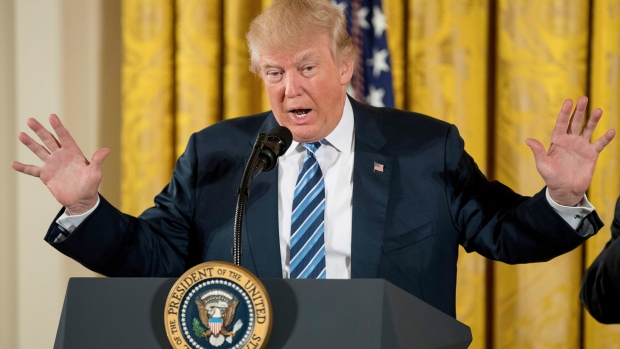Feb 3, 2017
Trump’s second week in office: Recapping reaction to the U.S. President’s travel ban
BNN Bloomberg

U.S. President Donald Trump continued to make waves during his second official week in office after he signed an executive order banning people from seven majority-Muslim countries from entering the United States.
The order bars entry to the U.S. for anyone from Iran, Iraq, Libya, Somalia, Sudan, Syria and Yemen for 90 days, and suspends the American refugee program for 120 days.
Throughout the week, business leaders across Canada spoke to BNN about the ban and how it could impact their companies. Here’s what some of them had to say:
VALA AFSHAR, CHIEF DIGITAL EVANGELIST, SALESFORCE
“I was born in Iran. My family and I left Iran during wartime in 1980. And as a child, I became a U.S. citizen in 1990. When the President’s Executive Order was issued late Friday evening, 48 hours after the fact (Sunday evening), there was still uncertainly in terms of U.S. citizens born in Iran being able to re-enter the U.S. I was scheduled to leave and join you in your studios the following day. Because of the uncertainty, and because I have three young children at home, I was not certain I could re-enter the U.S. So I chose to stay in Boston. At Salesforce, equality is a core value for our company, which is something that we proudly standby regardless of the changing conditions around us.”
MICHAEL KATCHEN, CEO, WEALTHSIMPLE
“I think how it’s changed the way we think is just the importance of re-affirming to our employees, and also the broader community, our support for diversity and our support for helping people all over the world get access to opportunities. For us, the first thing we did was send an email out to the team to tell them first, if are affected by this in any way, we’re here to support you; and it’s never going to affect your employment at Wealthsimple. And second, if there’s anything we possibly can do for the community we’re here to support them. We’re never going to hire on the basis of where someone was born.”
BEN BALDWIN, CO-FOUNDER, SCALEDRIVER
“One of the things that the Canadian companies need, especially fast-growing tech companies, is talent. But the response to this has been that it’s Canadians first. There’s not an economic thrust, it’s a Canadian thrust for all of these tightly-knit founders and tech companies. Diversity is so important to innovation.”
JOHN CHEN, CEO, BLACKBERRY
"I think any time that we have a great movement of talent that we could bring to Canada and increase our tech populations, it’s a good thing."
ALLEN LAU, CEO, WATTPAD
“Diversity is our unfair advantage as a country. When we try to address the global market, our very diversified workforce will help us understand the nuance in different markets very quickly. We have a few Americans working for us, and they are quite concerned…this is a real issue.”
JOHN RUFFOLO, CEO, OMERS VENTURES
“It is [having a] chilling [effect on] the other countries, like India, like China where there’s far more numbers. I think the general view that diversity is embraced in this country and it may not be embraced in the United States […] frankly, we’re surprised by the number of people in those large companies that are asking to be moved from the United States to Canada for fear of this thing actually getting worse.”
MICHAEL SERBINIS, CEO, LEAGUE
“The industry has come together with the message that diversity is our strength. I think this started for a very different reason than that we need more talent. A lot of us, if more than half of us, are immigrants or sons of immigrants. And we reacted to something that was clearly not right. I think what is clear … is not a whole lot of thought and vetting went into what we saw south of the border. And I think there will be changes… But the fact is I think a lot of damage has been done. ”
An earlier version of this story misidentified Vala Afshar as CEO of Salesforce. BNN regrets the error.


